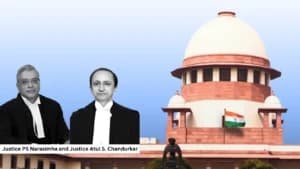The Supreme Court has stressed the urgent need for exclusive courts to handle trials under the Unlawful Activities (Prevention) Act (UAPA) and the Maharashtra Control of Organized Crime Act (MCOCA). This move comes in response to long delays observed in "hundreds of cases" under these special laws.
In its recent observation, the Court said:
“The most effective recourse [to address delay in trials] can be the establishment of dedicated courts to whom the trials under the special statutes can be entrusted, without giving them any other civil or criminal cases. Ideally, the trial should take place on a day-to-day basis.”
Read also: SC Collegium Recommends New Chief Justices for Five High Courts
The Court also pointed out that forming additional courts requires a policy decision, which falls under the Executive's domain. The bench directed Additional Solicitor General Raja Thakre to obtain necessary instructions within four weeks. The Court explained:
“Creation of additional courts, along with requisite infrastructure, is the domain of the Executive and also a part of their policy decision, which can be taken in consultation with the Chief Justice of the High Court, after securing complete data regarding pendency of the trials in the State.”
A bench comprising Justices Surya Kant and N Kotiswar Singh issued the directions, highlighting that the slow pace of trials, including those handled by the National Investigation Agency (NIA), is caused by trial judges being burdened with both civil and criminal matters.
Read also: Centre Appoints 7 Advocates as High Court Judges Across India
The Court also noted a serious issue faced by undertrials in special cases:
“In a situation where the under-trial is languishing in jail for years on one hand and on the other, the trial is yet to commence, there is a dilemma before the courts. The release or denial on bail is indirectly a breach of Article 21 of the Constitution.”
The Court further pointed out that the lack of judicial audit in these cases is one reason for the delay. The complexity and seriousness of these trials, involving hundreds of witnesses, have placed a massive burden on the judicial system.
Case Title: KAILASH RAMCHANDANI v. STATE OF MAHARASHTRA, SLP(Crl) No. 4276/2025














